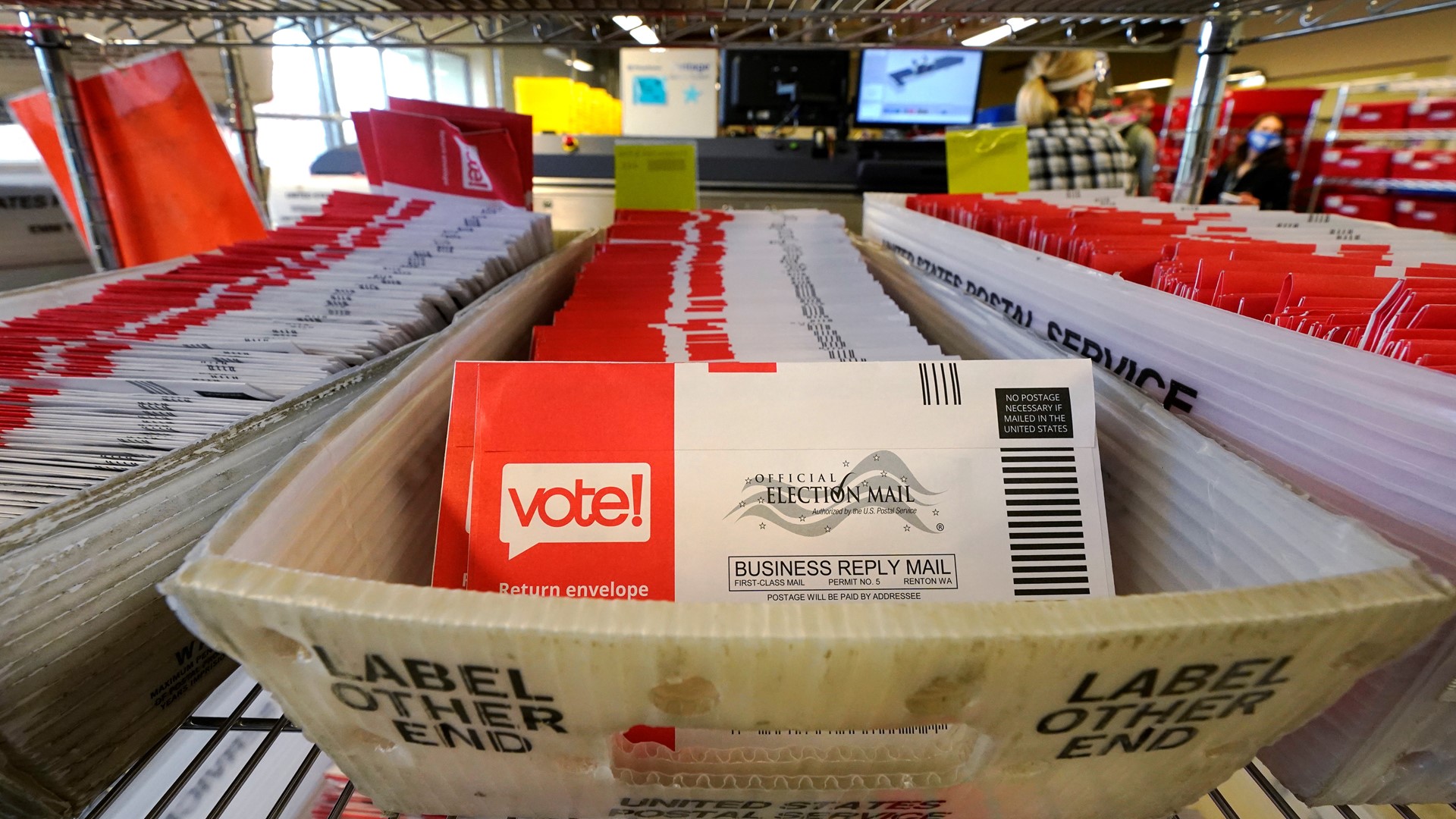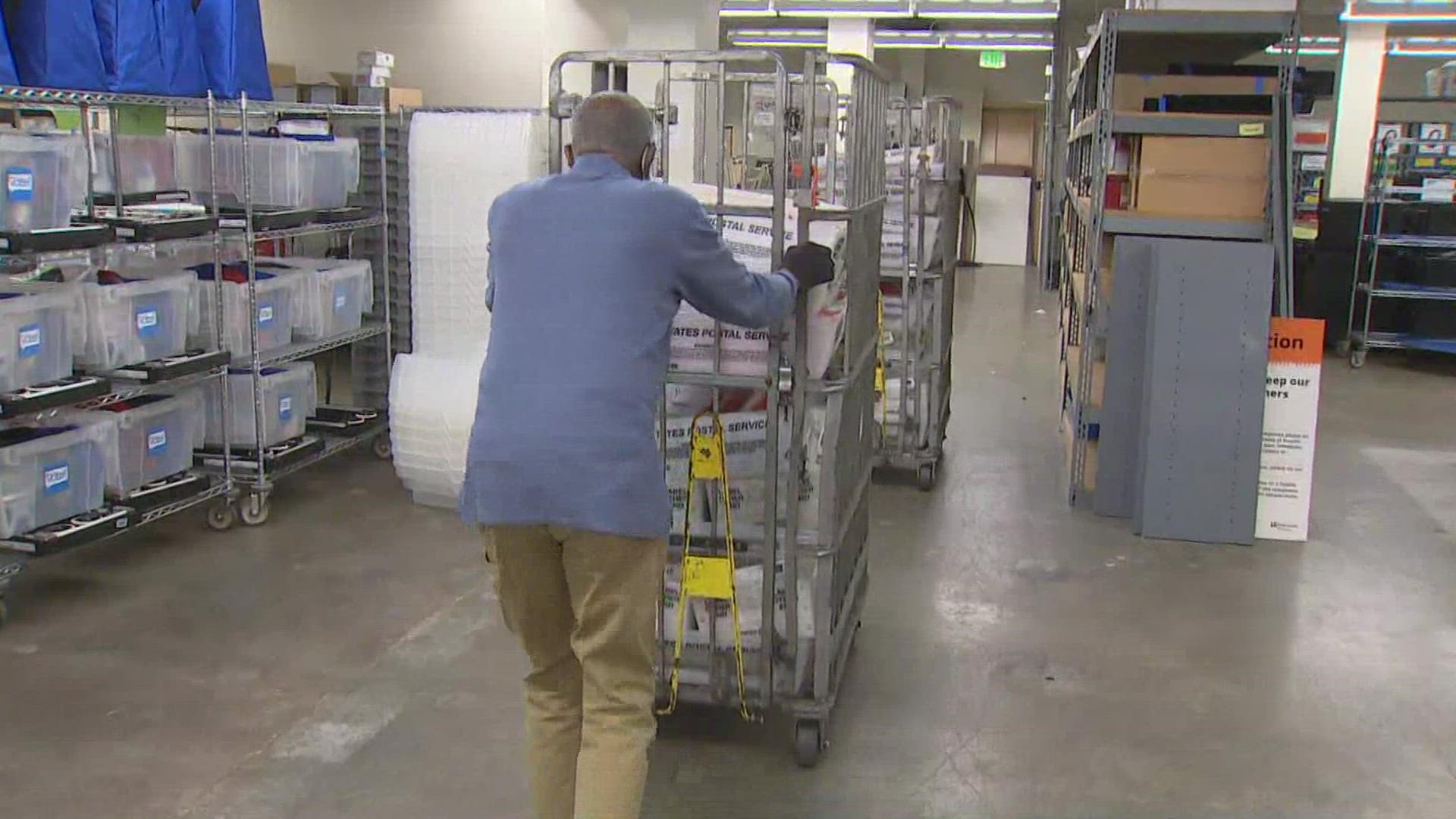Washington state 2021 general election voter's guide
Voter information and a guide to key races appearing on the general election ballot in Washington state.

Register to vote
Before you can vote in Washington state, you must register. Registration can be done in several ways: Online, by mail or in person.
To register online you'll need your Washington state driver's license or ID. Visit Votewa.gov and submit your information.
To register by mail, either print a voter registration form or request a registration form. Address the completed form to your county elections office address before mailing.
To register in person, visit your county election office (the Elections Division is open for curbside service during the pandemic).
To register to vote, you must be:
- A citizen of the United States
- A legal resident of Washington state
- At least 18 years old by Election Day
- Not disqualified from voting due to a court order
- Not under Department of Corrections supervision for a Washington felony conviction.
Dates and deadlines
Oct. 15: Ballots are mailed. Start of 18-day voting period begins.
Oct. 25: Online and mail registrations must be received at least eight days before Election Day. You can register to vote in person any time before 8 p.m. on Election Day.
Nov. 2: Deadline for voter registration or updates.
Nov. 2: Deposit ballot in an official drop box by 8 p.m.
Voting by mail
Washington has been a vote by mail state since 2011.
Registered voters do not need to request a ballot. Ballots are automatically mailed to the address the voter has registered.
Confirm your registration at VoteWA.gov.
Completed ballots can be dropped off at an official drop box or by mail. Stamps are not needed to mail a completed ballot.
Ballots must be deposited or postmarked by Election Day. The U.S. Postal Service recommends voters mail ballots a week prior.
Ballots must be signed. Signatures are checked against voter registration records.
Eligible voters are sent a ballot at least 18 days before Election Day.
Ballots are placed in a security envelope or sleeve.
The security envelope or sleeve is then put into a return envelope and signed.
Ballots have pre-paid postage and are returned through the mail or at ballot drop boxes. (If mailed, it must be postmarked by Election Day). Drop boxes are open until 8 p.m. on Election Day.
Tracking your ballot
After dropping off or mailing a ballot, voters can track the status of their ballot by visiting VoteWA.gov.
Voters must sign in.
On the navigation bar, select "Ballot Status."
Information includes when the ballot was sent, when it was returned and its current status.
How ballots are processed
After a ballot is delivered, envelopes are scanned and marked as "received" in the state system.
They are sorted by precinct and district.
Signatures on ballots are checked against voter registration records. (Voters are contacted before processing if a signature is missing or doesn't match.)
Envelopes are opened and the security sleeve is removed.
Ballots are removed from the security sleeve.
Ballots are reviewed for scanning issues, then scanned and stored.
Key races
Local races will appear on your ballot during the 2021 general election.
Here's a look at some of the key races in the Washington state Nov. 2 general election:
Seattle mayor
Seattle Mayor Jenny Durkan's choice not to seek another term has led to a general election race between a former city council president and current city council president.
M. Lorena González: Formerly a civil rights attorney, González is the current Seattle City Council president and holds a citywide seat. She was elected as the council’s first Latinx member in 2015.
During a debate Oct. 14, González said her top priority would be solving the homeless crisis. González said people living in the city's open spaces is "unacceptable" and work needs to be done to "rapidly increase shelter" while building more affordable housing.
Bruce Harrell: Harrell served three terms on Seattle City Council, including as president for three years at the end of his time on the council. He also briefly served as mayor when Ed Murray resigned in 2017. At the time, Harrell, who represented District 2 in South Seattle, decided not to run for re-election.
Harrell also said his top priority would be homelessness. There needs to be a dashboard that explains where the city is in terms of addressing the crisis, he said. The city needs to be "building and treating" its way out of the issue with a sense of urgency, he said.
King County executive
For the first time since 2009, incumbent Dow Constantine is facing a serious challenger for King County executive.
State Sen. Joe Nguyen is challenging Constantine, who is seeking his fourth term.
Constantine hasn't faced a serious challenge since he was first elected over former TV anchor Susan Hutchison.
Nguyen believes further reforms are needed in the King County Sheriff's Office and that Sheriff Mitzi Johanknecht should resign, rather than retire as his opponent has suggested.
Nguyen called out Constantine for his support of the construction of a new youth jail.
Constantine previously said he didn't see a difference in values with Nguyen and said he will take his campaign seriously. He defended his leadership on the youth jail, pointing out that the old building had asbestos and "rusty water;" the new building is half the size in an effort to reduce youth detention, he said.
Tacoma mayor
Incumbent Victoria Woodards is facing off against Steve Haverly.
On his website, Haverly says he seeks to expand the local economy while preserving public safety and supporting police, "not defunding policing." He believes in "increasing housing, while preserving the character of our neighborhoods."
"As the Mayor of Tacoma, I will bring Leadership and energy to our city. I am proud to be genuinely non-partisan. In a time of great division, and a very rough couple of years, we need unity now more than ever," he states on his website.
On her website, Woodards says the challenges Tacoma faces "do not have quick fixes, but we will re-open our economy and our schools safely." Woodards seeks to invest in infrastructure and "put people back to work" while ensuring "everyone has a roof over their head, enough to eat."
Woodards has been mayor since 2018. Before that she served for seven years as an at-large member of the Tacoma City Council.
Everett Mayor
Incumbent Cassie Franklin, who took office in 2018, faces challenger Steve Oss.
Oss has never run for office. According to his candidate statement, he has served in the military, owned a coin laundry and, since 1997, has worked for Everett Transit.
Oss says Everett's "financial deficit" needs to be addressed, otherwise "recovery will be very difficult." Businesses need to feel welcome.
Franklin has more than 20 years of executive and community leadership, according to the incumbent's candidate statement.
In order for Everett to recover, everyone needs to feel safe and supported, Franklin states. Franklin says she will continue to create jobs and increase community investments.
Seattle City Council
Position 8
Incumbent Teresa Mosqueda faces Kenneth Wilson to retain her seat on the Seattle City Council.
On his website, Wilson lays out four items in an agenda: homelessness, infrastructure and the West Seattle Bridge, protecting green space as development continues and public services and safety. When it comes to homelessness, Wilson says the city needs to be "led by reasoning to create lasting solutions through goals, analysis, and measured results."
Mosqueda lays out three priorities on her website: a resilient economy, affordable housing and an equitable and livable city. Mosqueda wants to create "equitable access to help small businesses" while making investments in economic activity. When it comes to housing, she says she will continue working to "build bridges" between advocates, businesses and labor to increase housing stability.
Position 9
Sara Nelson and Nikkita Oliver seek to replace outgoing council President Lorena González for her at-large position on the council.
Co-owner of Fremont Brewing Sara Nelson, who ran against Teresa Mosqueda in 2017, said she decided to run to help "get the city back on track" and wants to get the voice of a small business owner on the council.
Attorney and civic activist Nikkita Oliver, who ran for Seattle mayor in 2017, says on their campaign website that "meeting basic needs is a baseline for community safety." The city needs affordable and social housing, equitable transportation, affordable child care, fully funded schools, and more, their website states.
King County Council
Of the King County Council races, the race for District 3 recently attracted more attention after the council stripped leadership roles from incumbent Kathy Lambert following fallout from a controversial flyer she sent to her constituents earlier this month that was deemed racist.
Lambert said the flyers were designed to highlight the difference between her and her opponent, Sarah Perry. In a formal apology, Lambert said the message was "certainly not what was intended" and that she terminated her consultant's contract.
Also up for grabs are District 1, 5, 7 and 9.
Incumbent Rod Dembowski faces Sally Caverzan to serve District 1. Incumbent Dave Upthegrove faces Shukri Olow to represent District 5. Incumbent Pete von Reichbauer is up against Dominique Torgerson. And incumbent Reagan Dunn faces Kim-Khanh Van.
Advisory vote on capital gains tax
The Washington state Legislature imposed a capital gains excise tax, without voter approval, earlier this year.
The measure imposes a 7% tax on sale of stocks, bonds and other high-end assets in excess of $250,000 for individuals and couples.
The tax include exemptions for all real estate, retirement accounts, livestock, agricultural land, fishing privileges, family-owned small businesses, and more.
The capital gains excise tax is estimated to affect about 7,000 of the state's wealthiest taxpayers, generating $5.7 billion in its first ten years.
Revenues collected from the tax would be deposited in the Education Legacy Trust and Common School Construction Account. The money will be used to fund investments in K-12 education, childcare and early learning.
On Nov. 2, voters will voice their opinion over whether they want to maintain or repeal the excise tax. The advisory vote, however, will not result in an immediate change. An advisory vote allows voters to tell lawmakers their preference, which helps gauge public opinion.


